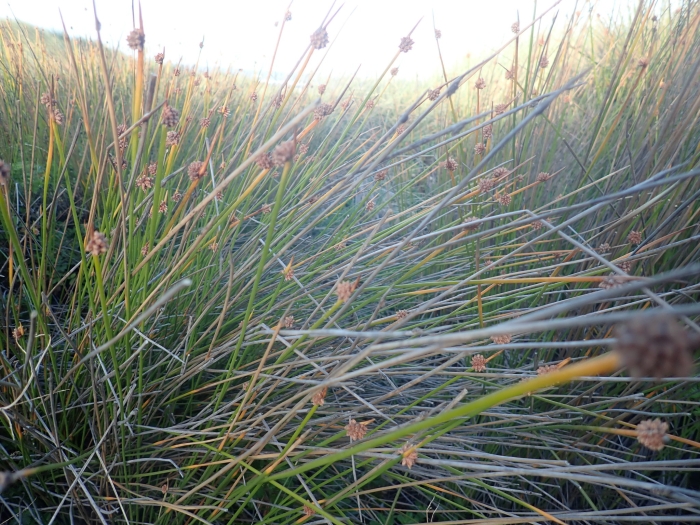Knotted Club-Rush
(Ficinia nodosa)
Knotted Club-Rush (Ficinia nodosa)
/
/

Arnim Littek
CC BY 4.0
Image By:
Arnim Littek
Recorded By:
Copyright:
CC BY 4.0
Copyright Notice:
Photo by: Arnim Littek | License Type: CC BY 4.0 | License URL: http://creativecommons.org/licenses/by/4.0/ | Rights Holder: Arnim Littek | Publisher: iNaturalist | Date Created: 2021-01-25T05:51:09-08:00 |





















































Estimated Native Range
Summary
Ficinia nodosa, commonly known as knotted club-rush or knobby club-rush, is a rhizomatous perennial herb native to coastal sand dunes, marshes, and saline environments in Australia, New Zealand, and South Africa. It typically grows to about 100 cm in height, with smooth, green-yellow stems that can spread up to 200 cm in diameter. The plant forms dense clusters of long green stems topped with small, rounded brownish flowers that are often present throughout the year, with a more pronounced flowering period in the summer season of the Southern Hemisphere, between September and December.
Ficinia nodosa is valued for its ability to thrive in challenging coastal conditions, making it an excellent choice for erosion control and dune stabilization. Its dense growth habit and ability to tolerate salt spray also make it suitable for coastal gardens and landscapes. Additionally, its potential use in biofiltration systems to remove heavy metals from water sources is a notable environmental benefit. In cultivation, it prefers full sun to part shade, requires low amounts of water once established, and thrives in sandy, well-drained soils. While it is low-maintenance, it can spread vigorously, so gardeners should consider controlling its growth in smaller spaces.CC BY-SA 4.0
Ficinia nodosa is valued for its ability to thrive in challenging coastal conditions, making it an excellent choice for erosion control and dune stabilization. Its dense growth habit and ability to tolerate salt spray also make it suitable for coastal gardens and landscapes. Additionally, its potential use in biofiltration systems to remove heavy metals from water sources is a notable environmental benefit. In cultivation, it prefers full sun to part shade, requires low amounts of water once established, and thrives in sandy, well-drained soils. While it is low-maintenance, it can spread vigorously, so gardeners should consider controlling its growth in smaller spaces.CC BY-SA 4.0
Plant Description
- Plant Type: Grass
- Height: 1-4 feet
- Width: 1-2.5 feet
- Growth Rate: Moderate
- Flower Color: N/A
- Flowering Season: Spring, Summer
- Leaf Retention: Evergreen
Growth Requirements
- Sun: Full Sun, Part Shade
- Water: Medium, High
- Drainage: Fast
Common Uses
Low Maintenance, Street Planting
Natural Habitat
Coastal sand dunes, marshes, and saline environments in Australia, New Zealand, and South Africa
Other Names
Common Names: Knobby Club-Rush
Scientific Names: , Isolepis nodosa, Ficinia nodosa, Scirpus nodosus, Holoschoenus nodosus, Isolepis monocephala, Scirpoides nodosa, Ficinia guttata, Fimbristylis schinzii, Fimbristylis textilis
GBIF Accepted Name: Ficinia nodosa (Rottb.) Goetgh., Muasya & D.A.Simpson